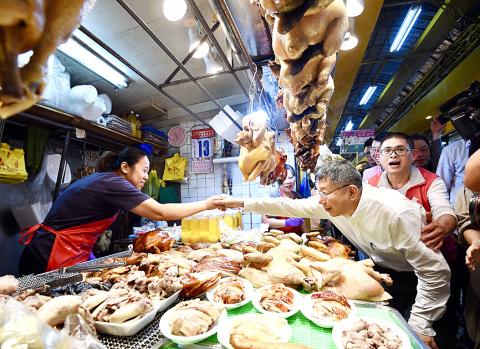Taipei Mayor Ko Wen-je (柯文哲) yesterday said he might have the weakest election campaign team, as he does not have the support of a political party, but added that his team still has 10 days before the nine-in-one elections to bring out the best result.
Ko, an independent seeking re-election, took leave from his post as Taipei mayor on Thursday last week to focus on his re-election campaign in the run-up to the Nov. 24 vote.
In response to media queries about his thoughts after canvassing support over the past few days, Ko said: “We are doing our best,” adding that he has visited several traditional markets, night markets and given speeches at companies from 7am to 10pm nearly every day.

Photo: Peter Lo, Taipei Times
“Frankly speaking, it is very difficult for independent candidates to run in an election, because there are still some basic techniques required to run a campaign,” he said, adding that having the support of a political party could increase a candidate’s votes by at least 5 percent.
“Our election campaign team could be called the weakest campaign team ever or might not even qualify as a campaign team, because they are mostly young people recruited through an audition and we do not have specialists to help with promotional broadcasts,” he said.
Ko said he learned about “plate theory” from a survey analyst who used “plates” as a metaphor for supporters of different camps.
He has been thinking about why the plates have significantly shifted since 2014, Ko said, adding that he thinks it was because Taiwanese often vote for a political party not because they like it, but because they hate the rival party.
“However, they often regret after voting, because other than their stances on unification or independence and a few ideologies, the two major parties are very similar,” he said, referring to the Democratic Progressive Party (DPP) and the Chinese Nationalist Party (KMT).
“Taiwan’s political scene has been overshadowed by the debate over unification or independence for about two decades, but I think it is a non-issue,” Ko said.
“It is impossible for the US to allow Taiwan to unify with China; it will try to avoid it, but the US will also not allow Taiwan to declare independence and infuriate China, so the debate is actually a pseudo-issue about fake unification and fake independence,” he said.
However, he added that although it is a pseudo-issue, it has real effects on the nation’s politics, such as the controversy over his campaign director Hsiao Yeh (小野) appearing in a video promoting DPP Kaohsiung mayoral candidate Chen Chi-mai (陳其邁), which Ko said triggered nerves in the pan-blue and pan-green camps, and shifted the “plates.”
When asked if he regrets having the “weakest campaign team,” Ko said he does not, because he wants to give young people an opportunity to be innovative.
He was nervous about letting a team of young people mostly under 35 organize the opening ceremony of last year’s Taipei Summer Universiade, “but they did an outstanding job,” Ko said.

‘DENIAL DEFENSE’: The US would increase its military presence with uncrewed ships, and submarines, while boosting defense in the Indo-Pacific, a Pete Hegseth memo said The US is reorienting its military strategy to focus primarily on deterring a potential Chinese invasion of Taiwan, a memo signed by US Secretary of Defense Pete Hegseth showed. The memo also called on Taiwan to increase its defense spending. The document, known as the “Interim National Defense Strategic Guidance,” was distributed this month and detailed the national defense plans of US President Donald Trump’s administration, an article in the Washington Post said on Saturday. It outlines how the US can prepare for a potential war with China and defend itself from threats in the “near abroad,” including Greenland and the Panama

A magnitude 4.9 earthquake struck off Tainan at 11:47am today, the Central Weather Administration (CWA) said. The hypocenter was 32.3km northeast of Tainan City Hall at a depth of 7.3km, CWA data showed. The intensity of the quake, which gauges the actual effect of a seismic event, measured 4 in Tainan and Chiayi County on Taiwan's seven-tier intensity scale, the data showed. The quake had an intensity of 3 in Chiayi City and County, and Yunlin County, while it was measured as 2 in Kaohsiung, Nantou County, Changhua County, Taitung County and offshore Penghu County, the data showed. There were no immediate reports of

The Chinese Nationalist Party (KMT) is maintaining close ties with Beijing, the Democratic Progressive Party (DPP) said yesterday, hours after a new round of Chinese military drills in the Taiwan Strait began. Political parties in a democracy have a responsibility to be loyal to the nation and defend its sovereignty, DPP spokesman Justin Wu (吳崢) told a news conference in Taipei. His comments came hours after Beijing announced via Chinese state media that the Chinese People’s Liberation Army’s Eastern Theater Command was holding large-scale drills simulating a multi-pronged attack on Taiwan. Contrary to the KMT’s claims that it is staunchly anti-communist, KMT Deputy

RESPONSE: The government would investigate incidents of Taiwanese entertainers in China promoting CCP propaganda online in contravention of the law, the source said Taiwanese entertainers living in China who are found to have contravened cross-strait regulations or collaborated with the Chinese Communist Party (CCP) could be subject to fines, a source said on Sunday. Several Taiwanese entertainers have posted on the social media platform Sina Weibo saying that Taiwan “must be returned” to China, and sharing news articles from Chinese state media. In response, the Mainland Affairs Council (MAC) has asked the Ministry of Culture to investigate whether the entertainers had contravened any laws, and asked for them to be questioned upon their return to Taiwan, an official familiar with the matter said. To curb repeated